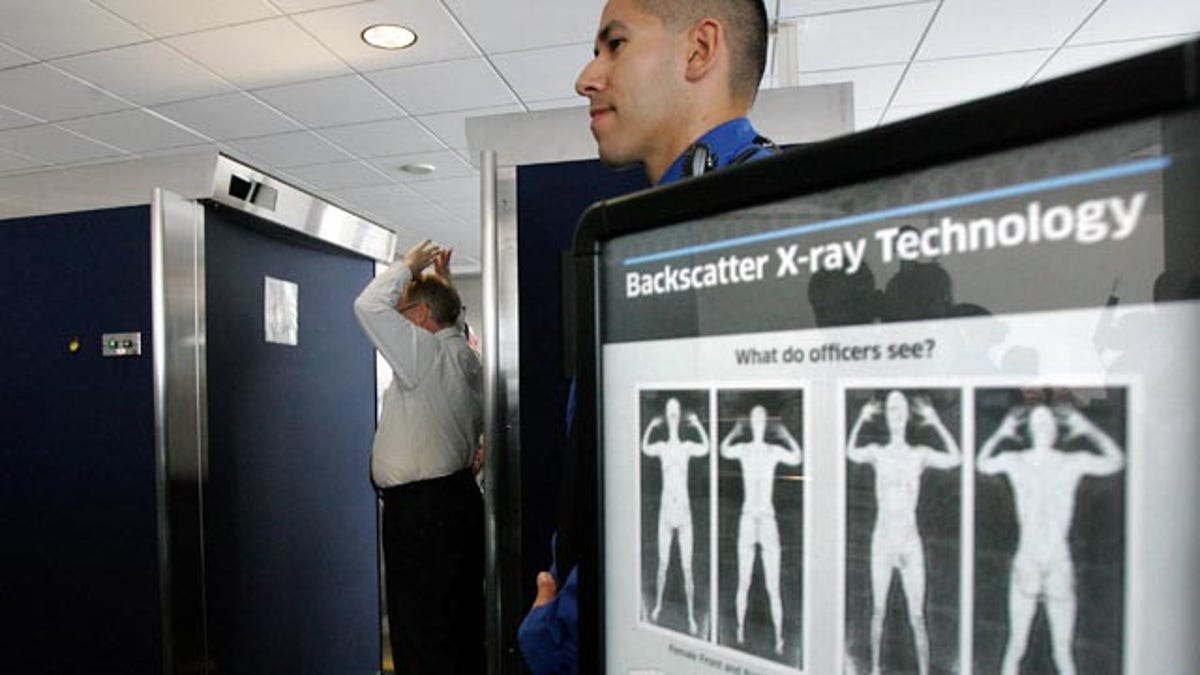
File: Transportation Security Administration employee Anthony Brock, left, demonstrates a new full-body scanner at San Diego's Lindbergh Field. (AP)
As critics blast new, more invasive pat-down procedures used by the Transportation Security Administration, the daughter of a woman who was killed on Sept. 11, 2001, said travelers need to acknowledge that security threats remain more than nine years after the terror attacks that killed nearly 3,000 people.
Carie Lemack, co-founder of Families of September 11 and the Global Survivors Network, suggested travelers find other modes of transportation if they're uncomfortable submitting to whole body imaging or newly implemented pat-down procedures that some claim are too invasive.
"People need to recognize that there's still a threat," Lemack told FoxNews.com in a telephone interview from London. "And I'm not saying that as a fearmonger. It's just a fact."
Lemack's mother, Judy Larocque, 50, was a passenger on American Airlines Flight 11, which was deliberately crashed into the North Tower of the World Trade Center in New York. Lemack, 35, said she feels obligated to implore those who oppose aviation security measures to instead propose viable alternatives.
“We're Americans, we can meet this threat, we can counter it," Lemack said. "I think they don't want to go through what my mom went through. I don't want to let her down and I want to make sure what happened to her never happens again."
Lemack, who will return to the United States on Wednesday via a commercial flight, said she will submit to security checks of any kind and urged others to do so.
And she is not alone. Mary and Frank Fetchet, whose son, Bradley James Fetchet, was killed on Sept. 11, have also issued a statement in support of the new measures, citing the failed Christmas Day plot last December as a reminder that "comprehensive security measures" are still needed.
A recent CBS poll found that 81 percent of Americans support the use of full-body imaging at airports, compared to just 15 percent who oppose the new technology.
On the other side of the checkpoint, so to speak, at least two online campaigns are urging travelers to "opt out" of the whole body imaging process in favor of enhanced pat-down procedures or forgoing flying altogether.
OptOutDay.com bills itself as an "educational outreach campaign" designed to let travelers know of their right to not submit to full-body scanning on the day before Thanksgiving, one of the busiest travel days of the year.
"This is their right, given to them by the TSA," the website reads. "If they do not like the current procedures when they go through it, they should voice their opinion to the airlines and their members of Congress, in addition to filing a complaint with the TSA and outside groups, if necessary."
As of Wednesday, more than 5,200 gave their thumbs-up to a Facebook page for National Opt-Out Day and another 9,200 "liked" a Facebook page for a campaign called “We Won't Fly,” which also stresses opting-out of the whole body imaging but also urges consumers to consider not flying at all to "hit the airlines in the pocketbook," according to its website.
Nick Kimball, a TSA spokesman, said it was "irresponsible" for groups to suggest that travelers opt-out of the whole body imaging.
"On the eve of a major national holiday, and less than one year after Al Qaeda's failed attack last Christmas Day, it's irresponsible for a group to suggest that travelers opt out of the very screening that could prevent an attack using non-metallic explosives that would not be detected by a standard metal detector," Kimball told FoxNews.com.
"The threats are real and the technology and other security measures that we have in place are informed by intelligence and are the best opportunity to keep the traveling public safe."
Roughly 2 million people fly every day in the United States, according to Kimball.
Meanwhile, two commercial airline pilots have filed a lawsuit against the federal government claiming new airport screening procedures violate their constitutional rights.
Michael Roberts, of Memphis, a pilot with ExpressJet, and Ann Poe of Fort Lauderdale, Fla., a Continental Airlines pilot, sued the Department of Homeland Security and Transportation Security Administration in federal court in Washington on Tuesday.
Roberts and Poe, one of the first 100 female commercial airline pilots in the United States, have not worked since separate incidents in which they refused to submit to TSA security officers for full body scans or the enhanced pat-downs.
Roberts and Poe, according to their lawsuit filed by The Rutherford Institute, claim that the screening process violates Fourth Amendment protection against unreasonable search and seizure.
"Forcing Americans to undergo a virtual strip search as a matter of course in reporting to work or boarding an airplane when there is no suspicion of wrongdoing is a grotesque violation of our civil liberties, undermining our right to privacy and to be free from unreasonable searches and seizures by government agents," said John W. Whitehead, president of The Rutherford Institute, a Virginia-based conservative civil liberties organization.
"Indeed, TSA is forcing travelers to consent to a virtual strip search or allow an unknown officer to literally place his or her hands in your pants."











































